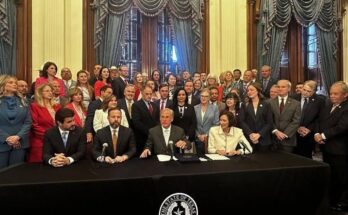Speaker Mike Johnson Served With Lawsuit as He Leaves House Floor — Arizona’s AG and Congresswoman-Elect Grijalva Strike Back
The corridors of Capitol Hill turned tense on Tuesday as House Speaker Mike Johnson was reportedly served with a lawsuit moments after leaving the House Floor. The dramatic moment, witnessed by several aides and reporters, comes amid a fierce political and legal standoff that has captivated Washington.

According to reports from MeidasTouch host Ben Meiselas, the lawsuit was filed by Arizona Congresswoman-elect Adelita Grijalva, alongside Arizona Attorney General Kris Mayes, alleging that Speaker Johnson unlawfully blocked Grijalva’s constitutional right to be sworn into office.
The legal action marks a new flashpoint in the ongoing battle over House control, procedure, and partisan power — thrusting Johnson once again into the center of controversy.
The Lawsuit: “A Denial of Representation”
Adelita Grijalva, who recently won a special election to fill her late father Raúl Grijalva’s seat, has yet to be officially sworn in as a Member of Congress. Despite her election being certified, Speaker Johnson has refused to administer the oath, citing ongoing procedural disruptions and the federal government shutdown.
Arizona Attorney General Kris Mayes called the move “a violation of constitutional rights” and an “affront to the democratic process.”
“By refusing to swear in Congresswoman-elect Grijalva, Speaker Johnson is effectively silencing the voices of more than 800,000 Arizonans,” Mayes said in a statement. “This is taxation without representation.”
The lawsuit, filed in federal court in Washington, D.C., seeks a declaratory judgment compelling Johnson to immediately seat Grijalva — or, alternatively, to authorize another House official to administer the oath.
Grijalva herself denounced Johnson’s decision as “an abuse of authority for political ends,” asserting that “no Speaker should have the power to hold an entire district hostage.”
Political Shockwaves in Washington
The timing of the lawsuit could not be more combustible. Congress remains paralyzed by a prolonged government shutdown, and tensions between Republicans and Democrats have reached a fever pitch.

Multiple analysts point out that Grijalva’s vote could tip key balance points within the House. Democrats claim that Johnson’s refusal to seat her is strategically motivated — to prevent her from joining votes on high-profile issues, including an ongoing push to release investigative files related to the late financier Jeffrey Epstein.
Democratic strategist Rebecca Solis commented,
“This isn’t about scheduling. It’s about control. Grijalva’s vote could unlock a series of investigations Republicans would rather bury.”
Johnson, however, has vehemently denied these allegations. Speaking briefly to reporters outside the Capitol, he dismissed the lawsuit as “a partisan stunt” and said Grijalva would be sworn in “when procedural timing allows.”
“This is standard procedure during an adjournment period,” Johnson said. “No member is being singled out. The House will act appropriately when we return to full session.”
Yet critics note that such delays are unprecedented in modern history. According to congressional scholars, no certified member-elect has ever waited this long to take the oath after a verified election result — a fact that could weigh heavily in court.
Constitutional Gray Area
The case raises thorny constitutional questions. Under Article I, Section 5 of the U.S. Constitution, each chamber of Congress has the authority to “be the Judge of the Elections, Returns and Qualifications of its own Members.” This gives the House wide discretion in determining when and how a member is seated.
But experts argue that Johnson’s use of that power may be stretching precedent.
Professor Elaine Jacobs, a constitutional law scholar at Georgetown University, explained:
“The House does have autonomy in seating members, but that authority cannot override a state’s certified election result without due cause. Refusing to administer the oath indefinitely could be seen as disenfranchisement.”
If the federal court sides with Grijalva, it could set a rare legal precedent — potentially limiting the Speaker’s discretion in future swearing-in delays.
Voices from Arizona
Back in Tucson and Yuma, frustration is mounting. Constituents of Arizona’s 7th Congressional District have been left without representation during one of the most turbulent legislative periods in years.

Local resident Sofia Mendoza told Arizona Mirror:
“We voted. She won. And now we’re just waiting for Washington to do its job. It feels like our voices don’t count.”
Grijalva has continued to work from Arizona, holding virtual town halls and coordinating with her late father’s former staff. However, she lacks access to federal resources, committee briefings, or even an official congressional office — all of which require formal swearing-in.
What Happens Next
The lawsuit now moves to the U.S. District Court for the District of Columbia, where an expedited review has been requested. Legal experts predict a rapid hearing, though many doubt the judiciary will want to intervene directly in congressional procedure.
Behind the scenes, pressure is growing on Speaker Johnson. Several moderate Republicans have privately urged him to resolve the issue swiftly, warning that the optics of “blocking an elected Latina congresswoman” could further damage the party’s image ahead of 2026 midterms.
As of Wednesday evening, Johnson’s office has declined to comment further, while Grijalva vowed to “fight until every Arizonan has their seat back in Congress.”
“This is bigger than me,” she said. “This is about democracy itself.”
Analysis: A Power Struggle in Plain Sight
The spectacle of a Speaker being served with a lawsuit on Capitol Hill underscores just how fractured Washington has become. What once would have been a procedural formality — a freshman member taking the oath — has turned into a symbolic battle over power, process, and representation.
Whether the courts intervene or the House relents, one thing is clear:
This clash is no longer just about one seat in Congress. It’s about who holds the power to define democracy’s rules — and how far they are willing to bend them.



